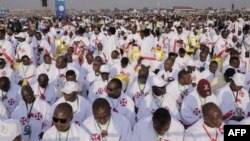Francis entered the airport grounds aboard his "popemobile" and was greeted by singing and dancing crowds before the mass began at around 0830 GMT.
Organisers said that over one million people were on the airport tarmac. Some came the day before to claim a spot.
The attendees included Kinshasa residents as well as the Democratic Republic of Congo's president, Felix Tshisekedi, and leading opposition politicians.
Francis wished the crowd peace in Lingala, one of the DRC's four national languages and the everyday language of Kinshasa.
The pope delivered the rest of his homily in Italian, which was translated into the DRC's official language French, in which he urged the faithful "not to give in to divisions."
The 86-year-old pontiff had arrived in the DRC on Tuesday, on the first leg of a six-day trip to Africa that will also include troubled South Sudan.
DRC is Africa's most Catholic country. Official Vatican statistics put the proportion of Catholics in the DRC at 49 percent of the population.
Another 35 percent of the population is Protestant of various denominations, nine percent is Muslim and 10 percent Kimbanguist -- a Christian movement born in the Belgian Congo.
- 'Massively plundered' -
During a speech to politicians and dignitaries in Kinshasa's presidential palace on Tuesday, Francis denounced the "economic colonialism" he suggested had wreaked lasting damage in the DRC.
"This country, massively plundered, has not benefited adequately from its immense resources," he said, to applause.
Despite abundant mineral reserves, the DRC is one of the poorest countries in the world. About two-thirds of Congolese people live on less than $2.15 a day, according to the World Bank.
- Meeting conflict victims -
Francis also met victims of the conflict in eastern DRC in Kinshasa on Wednesday following the mega-mass.
Afterward, he talked to representatives from charitable organizations.
The trip to DRC and South Sudan had originally been planned for July 2022, but it was postponed due to the pontiff's knee pain that has forced him in recent months to use a wheelchair.
Security concerns were also said to play a role in delaying the trip, and a stop in Goma - a city of over a million people on the border with Rwanda - is no longer on the itinerary.
"I would have liked to go to Goma too, but with the war, you can't go there," Francis told reporters on the plane from Rome.
The Argentine pontiff, in his speech in Kinshasa on Tuesday, urged the need to address the conflict and said he supported regional peace efforts.
Francis also underlined the need for investment in education, and free-and-fair elections, among other issues.
On Friday, the pope travels to South Sudan's capital Juba.
This visit is Francis's 40th foreign trip since being elected in 2013.
